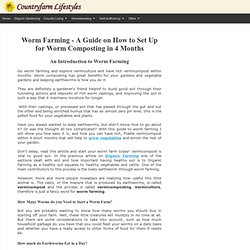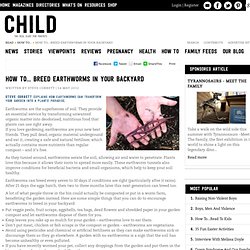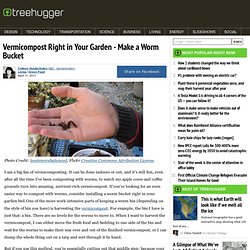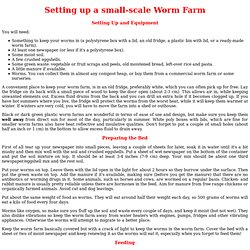

DIY Worm Farm. Worm Farming: A Guide On How To Set Up A Worm Farm. An Introduction to Worm Farming Go worm farming and explore vermiculture and have rich vermicompost within months.

Worm composting has great benefits for your gardens and vegetable gardens and keeping earthworms is how you do it. They are definitely a gardener's friend helpinf to build good soil through their tunneling actions and deposits of rich worm castings, and improving the soil in such a way that it maintains moisture for longer. With their castings, or processed soil that has passed through the gut and out the other end being enriched humus that has an almost zero pH level, this is the pefect food for your vegetables and plants. Have you always wanted to keep earthworms, but didn't know how to go about it? Don't delay, read this article and start your worm farm today! However, more and more people nowadays are realizing how useful this little animal is.
How To Breed Earthworms In Your Backyard. Written by Steve Corbett | 14 May 2012 Steve Corbett explains how earthworms can transform your garden into a plants' paradise.

Earthworms are the superheroes of soil. They provide an essential service by transforming unwanted organic matter into deodorised, nutritious food that plants can use right away. If you love gardening, earthworms are your new best friends. They pull dead, organic material underground and eat it, creating a safe and natural fertiliser, which actually contains more nutrients than regular compost – and it's free. As they tunnel around, earthworms aerate the soil, allowing air and water to penetrate. Earthworms can breed every seven to 10 days if conditions are right (particularly after it rains). A lot of what people throw in the bin could actually be composted or put in a worm farm, benefitting the garden instead.
Vermicompost Right In Your Garden - Make A Worm Bucket. Photo Credit: lessismorebalanced, Flickr Creative Commons Attribution License.

I am a big fan of vermicomposting. It can be done indoors or out, and it's still fun, even after all the time I've been composting with worms, to watch my apple cores and coffee grounds turn into amazing, nutrient-rich vermicompost. If you're looking for an even easier way to compost with worms, consider installing a worm bucket right in your garden bed.One of the more work-intensive parts of keeping a worm bin (depending on the style of bin you have) is harvesting the vermicompost. For example, the bin I have is just that: a bin. There are no levels for the worms to move to. But if you use this method, you're essentially cutting out that middle step, because your worms will be doing their composting work right in your vegetable or flower garden bed. Setting Up A Small-Scale Worm Farm. Setting Up and Equipment You will need: Something to keep your worms in (a polystyrene box with a lid, an old fridge, a plastic bin with lid, or a ready-made worm farm).

At least one newspaper (or less if it's a polystyrene box). Some moist soil. A few crushed eggshells. A convenient place to keep your worm farm, is in an old fridge, preferably white, which you can often pick up for free. Black or dark green plastic worm farms are wonderful in terms of ease of use and design, but make sure you keep them well away from direct sun for most of the day, particularly in summer.
Preparing the Bed First of all tear up your newspaper into small pieces, leaving a couple of sheets for later, soak it in water until it's a bit mushy and then mix well with the soil and crushed eggshells. Put your worms on top. Put about the same weight of food as worms. Worms like oxygen, so make sure you fluff up the soil and waste every couple of days, and keep it moist (but not wet). Feeding Harvesting. What Do Worms Eat? All About The Diet Of Worms. A worm’s diet is based off of where they live and if they are surface worms or they live deep under the ground.

Worms that are generally near the surface of the dirt can eat anything from dead leaves to cardboard all the way to melon rinds and sawdust. For this reason, many people have taken to using worm buckets to process a lot of their garbage instead of having it sit in landfills where it cannot decompose properly.